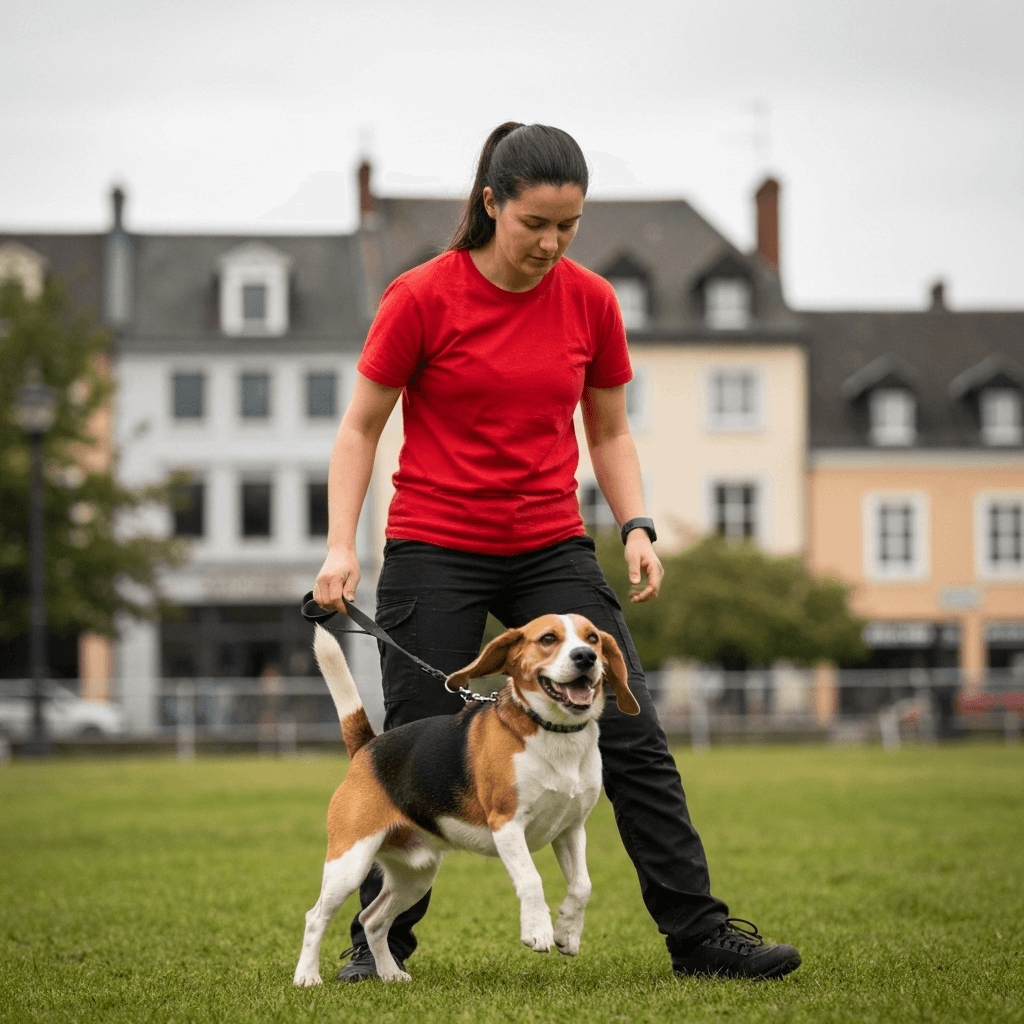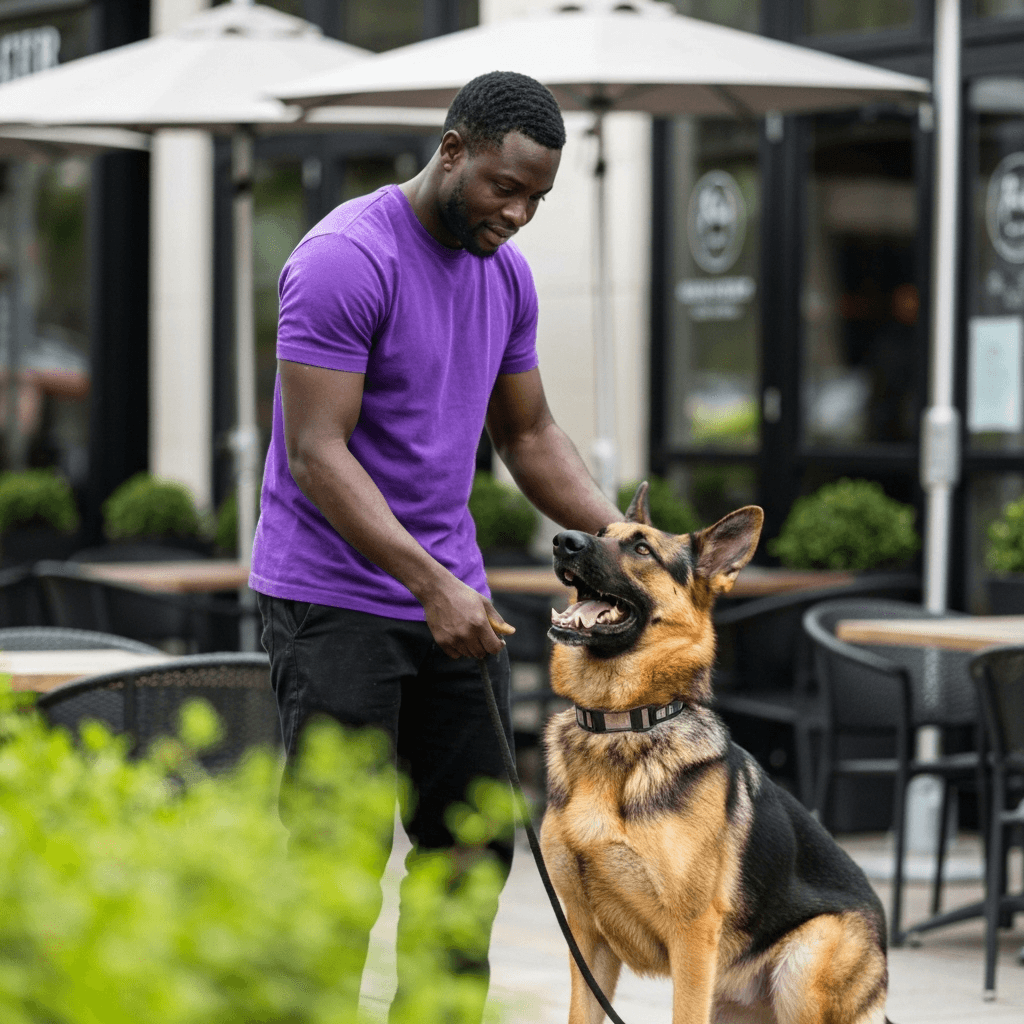Your Complete Guide to Choosing a Dog Trainer in Arab
When you live in Arab with your dog, you want them to walk nicely through Arab City Park, behave politely on Main Street, and stay calm during trips to the vet. The right training prepares your dog for real life here, whether that’s neighborhood walks or weekend adventures to Lake Guntersville.
Since Arab sits mostly in Marshall County with a small section in Cullman County, it helps to find trainers who understand both counties’ rules. They can also recommend the best local spots to practice what your dog learns.
How to Choose the Right Trainer
Start by looking for trainers who use positive reinforcement methods and create clear goals for your specific situation. A good training plan should cover the basics like loose-leash walking on local sidewalks, calm greetings at parks, and relaxed behavior around the busy youth sports fields.
Credentials give you a way to compare different trainers’ experience levels. You can learn about common dog trainer certifications and ask potential trainers about options like CPDT-KA, KPA-CTP, or behavior-focused certifications such as IAABC-CDBC. If your dog shows aggression, ask about CBCC-KA or comprehensive programs like CTC. Some trainers also maintain hands-on skills through CPDT-KSA certification.
In-home training works especially well for puppies, door manners, yard reactivity, and leash work in your actual neighborhood. Group classes become more useful once your dog can focus around other dogs without getting too excited or stressed.
Common Dog Training Methods Explained

Reward-based training builds trust between you and your dog while creating lasting behavior changes. These methods also help you follow Marshall and Cullman County rules about keeping dogs under control in public spaces.
Basic obedience covers essential commands like sit, down, stay, come, place, and leash manners. These skills help your dog handle Arab parks, sidewalks, and restaurant patios without pulling on the leash or jumping on people.
Puppy training focuses on socialization, potty training, crate comfort, leash training, and gentle handling practice. Short, fun training sessions help prevent problem behaviors before they become habits.
Behavior modification addresses issues like fear, reactivity, resource guarding, or separation anxiety through careful desensitization and counterconditioning techniques. If your dog’s behavior involves safety concerns or might have medical causes, ask whether the trainer coordinates with veterinarians.
Specialized options like therapy dog training or service dog training require extremely calm public behavior and step-by-step training plans that include public access manners. These programs take much longer than basic obedience.
Avoid trainers who rely on pain, fear, or intimidation to change behavior. Humane methods are safer for everyone, easier to maintain at home, and help keep good relationships with neighbors.
Average Cost of Dog Training in Arab (Updated for 2025)
Training rates around Arab, Marshall County, and the Cullman side of town typically run lower than big-city prices. Some trainers may add a small travel fee if you live outside the main city limits, and expect higher rates for serious behavior problems.
| Service Type | Typical Cost (Arab/Marshall-Cullman) |
|---|---|
| Puppy classes, 4–6 weeks | $120–$220 total |
| Group obedience classes, 4–6 weeks | $140–$250 total |
| Private lessons, 60–75 min | $85–$150 per session |
| In-home dog training packages, 4–6 visits | $360–$780 total |
| Day training, per week | $400–$800 per week |
| Initial behavior consult | $120–$200 |
| Board and train, 2–4 weeks | $1,800–$3,800 total |
Always ask what’s included in the price, how the trainer tracks progress, and whether they offer a free consultation or evaluation. This helps you avoid surprise costs later.
Questions to Ask a Potential Dog Trainer
- What training methods do you use to keep sessions positive and low-stress?
- What certifications do you hold, like CPDT-KA or KPA-CTP, and do you take continuing education classes?
- How will you customize the training plan for my goals and our daily routine in Arab?
- Do you offer private lessons, group classes, in-home visits, or board and train programs, and which would work best for my dog?
- How will we track my dog’s progress between training sessions?
- What are the total costs, including any travel fees or required equipment?
- Do you carry liability insurance, and can you show me proof of coverage?
- For behavior problems, will you work with my veterinarian if needed?
- Can you train in the actual places I take my dog, like Arab City Park or Main Street?
- What homework should I do between visits to help my dog succeed?
Local Rules and Considerations in Arab
Leash laws apply in all public areas unless you’re inside a designated off-leash dog park. Keep a standard 6-foot leash handy for parks, sidewalks, and community events.
Alabama requires current rabies vaccination for all dogs, and your dog must wear a visible rabies tag. You can find detailed requirements on the state website at Alabama Public Health Rabies.
Nuisance problems like excessive barking can lead to neighbor complaints and potential fines. Training should include quiet cues, mental enrichment activities, and routines that help your dog stay calm when left alone.
Dog trainers in Alabama don’t need special state licenses, but they should hold a local business license if they operate in Arab. Professional liability insurance is standard practice, and trainers who board dogs for payment may need additional permits under state animal welfare rules.
If you live on the Cullman County side of Arab or use county services, you can find local guidance through Cullman County Animal Control.
Local Arab Resources for Dog Owners and Surrounding Areas
Arab City Park offers walking paths and green spaces perfect for leashed practice sessions. Mornings and mid-day on weekdays tend to be less crowded and easier for training.
Heritage Bark Park in Cullman provides fenced, off-leash space for recall work and practicing polite greetings with other dogs. Guntersville Dog Park near the lakefront has separate areas and posted rules for safe off-leash practice.
Sand Mountain Park Dog Park in Albertville features separate sections for small and large dogs. The sidewalks along Main Street in Arab work well for real-life leash manners and learning to pass by distractions calmly.
Always follow posted rules at any location, bring waste bags, and try to avoid peak busy times when you’re just starting training.

Common Questions
How much does in-home dog training cost?
Most trainers in the Arab area charge $85–$150 per in-home visit. Package deals with 4–6 visits typically run $360–$780 and often include phone support and written training plans.
Is in-home dog training worth it?
Yes, especially for specific problems like door manners, yard reactivity, and leash control. You can address issues exactly where they happen and practice on the routes you actually walk every day.
Can you pay someone to house train your dog?
Many trainers offer puppy programs that include structured potty training, crate routines, and schedule development. Day training programs can speed up results, but you’ll still need to practice consistently between visits.
What is the 3-3-3 rule for dog training?
This guideline suggests dogs need about 3 days to decompress in a new situation, 3 weeks to learn your routine, and 3 months to fully settle in. Plan your training timeline with these phases in mind.
How long will it take to reach my training goals?
Most puppies and easygoing adult dogs show steady improvement within 4–8 weeks when you practice daily. Dogs with reactivity or aggression issues usually need several months of careful behavior modification work.
What should I bring to group classes?
Pack high-value treats, a flat collar or harness, a 6-foot leash, water for your dog, and current vaccination records if requested. Leave retractable leashes at home since they make training harder.
What’s the leash law in Arab?
Dogs must stay leashed and under control in all public spaces except inside posted off-leash dog parks. A 6-foot leash works best for sidewalks, parks, and community events.
Do I need a dog license in Arab or Marshall County?
There’s no general pet licensing requirement, but your dog must have current rabies vaccination and wear the rabies tag. If you live on the Cullman County side of Arab, check their Animal Control page for specific county information.
What shots does my dog need in Marshall County or Alabama?
Rabies vaccination is required throughout Alabama. Your veterinarian may also recommend core vaccines like distemper-parvo and bordetella based on your dog’s lifestyle and risk factors.
Are dog trainers required to be licensed in Arab or Marshall County or Alabama?
No special trainer licensing exists in Alabama. Trainers should follow normal business regulations, carry liability insurance, and get proper permits if they use public spaces for paid training sessions.
Where can I practice off-leash recall?
Use fenced dog parks like Heritage Bark Park in Cullman, Guntersville Dog Park, or Sand Mountain Park Dog Park. Start during quieter hours to reduce distractions while your dog learns.
Which dog parks allow training around Arab?
Heritage Bark Park, Guntersville Dog Park, and Sand Mountain Park Dog Park all allow off-leash practice within their fenced boundaries. Follow posted etiquette rules and keep training sessions short to be considerate of other visitors.
What beaches or trails allow dogs for training?
While there are no ocean beaches nearby, leashed dogs are welcome on many trails around Lake Guntersville. Check the specific pet rules before you visit at Lake Guntersville State Park pet policies.
Finding the right training approach means combining humane methods with regular practice in the Arab locations you visit most often. With a clear plan and a professional dog trainer who understands the local area, you can help your dog become the calm, well-behaved companion you want them to be.
